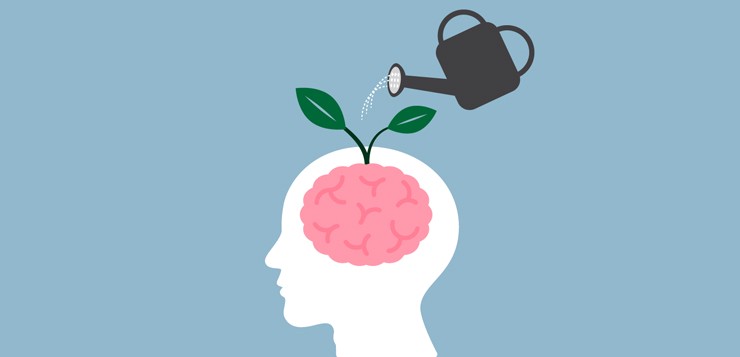The brain is the grand conductor of the symphony of our selves. The brain leads mind and body, and the brain heeds mind and body. The brain plays a role in every thought, feeling, and body sensation we experience. That includes every twitch, every blink, every strum of a guitar, and even every orgasm. That also includes every dream, passion, fear, joy, and deepest desire.
Every memory you consolidated last night while you slept, each micro-movement used to brush your teeth this morning, every smoothie you tasted, step you took, daydream you pondered, daydream you snapped out of, work you intently focused upon, yawn you took, anxiety you felt, drop in blood sugar you experienced, was a manifestation of lots of talking. A plethora of dialogue went on inside of you today, and you need to know it.
Quick Brain Basics:
The brain and the spinal cord make up the nervous system, composed of billions of nerve cells (i.e. neurons) that speak back and forth between the brain and body. What’s the conversation like? Well, the nervous system is at least bilingual, and speaks both electrically and chemically. When neurons (the brain’s cells) are stimulated, an electrical impulse, called an action potential, is created. This eventually leads to the transmission of chemical substances called neurotransmitters, like norepinephrine, dopamine and serotonin, which we know play a huge role in our mood functioning, among a lot of other things.
Why is it so important to know how much chatter the brain is doing? Because to be mindful of the orchestration of our internal states (some in reaction to the external) is to be mindful of the essentiality of nourishing our brains.
The latest scientific research shows that neuroplasticity, the idea that new neurons can be created, makes it very possible for lifestyle to play a big role in maintaining and improving brain function. Of course, as always, nature and nurture dance an exquisite but complex dance, and so there is never one solution or one cause and effect paradigm when it comes to your wellness. Yet, there is something each of us can do to help our brains stay vital:
1. Reduce your stress levels by practicing mindfulness meditation.
Although stress is a temporarily adaptive response to a threat, when it is chronic it becomes maladaptive and can wreak havoc on the central nervous system (CNS). Stress-reduction and relaxation techniques are important for a healthy brain. A widely used relaxation-inducing technique is meditation. Mindfulness meditation has been shown to be particularly effective. Studies have indicated that the amygdala, known as our brain’s “fight or flight” center and the seat of our fearful and anxious emotions, decreases in brain cell volume after mindfulness practice. Mindfulness meditation has been shown to help ease psychological stresses like anxiety, depression, and pain. Research is still parsing out the exact mechanisms, but many agree that on a cognitive level, mindfulness’s ability to cultivate attention on purpose, in the present moment, and non-judgmentally, helps reduce the stress elicited by past and/or future oriented thinking.
2. Get your blood pumping through exercise.
Exercise is a life force, and there are many reasons why it is a crucial part of basic brain hygiene. One reason is that exercise actually raises serotonin levels (most antidepressants focus on the production of serotonin). That’s just the tip of the iceberg though with regards to exercise’s benefits, which is why it is always in my top three recommendations to clients who want to thrive cognitively as they age.
3. Use it, so you don’t lose it, by engaging in mental stimulation.
Lifelong students have the right idea when it comes to staving off age-related brain decline. Continued learning actually promotes brain health, and might actually create new neural connections. This kind of neuroplasticity is a handy defense against future cell loss. So in essence, taking a stab at a crossword puzzle, or enrolling in a continuing education course can help build cognitive reserves. The biggest bang for the brain are tasks that are challenging, varied, and novel.
4. Nourish your body and brain with balanced nutrition.
Our brain’s health is dependent on our many lifestyle choices that mediate gut health, including most notably diet i.e., reduction of excess sugar and refined carbohydrates, and increased pre and probiotic intake. Poor gut health, elicited by dysbiosis (a shift away from “normal” gut microbiota diversity), may contribute to disease, and has been implicated in neurological and neuropsychiatric disorders like multiple sclerosis, autistic spectrum disorders, Parkinson’s disease, and even Alzheimer’s disease. Further, there is now research that suggests that depression and anxiety are mediated by poor gut health as well.
5. Stay positively connected to yourself and others by socializing.
Joining a community center, or even a meet-up group adventure is actually an investment in your future. Research continues to support the positive impact of social interaction on the brain. So much so, that studies even go so far as indicating that social interaction is a key to warding off dementia, including the Alzheimer’s. Even basic exchanges with people keep our brains stimulated as it searches for thoughts and a way to organize them into appropriate communication bytes. Also, let’s not forget that being part of a social network often elicits healthy behaviors, most notably joining a walking group, or engaging in other group exercise. So, keep your friends and family close to help maintain cognitive processes.
Subscribe to learn more about the best mindfulness practices.
Originally published at www.mindful.org on April 20, 2016.
Originally published at medium.com


